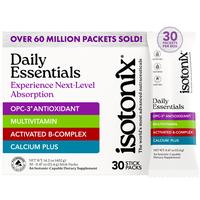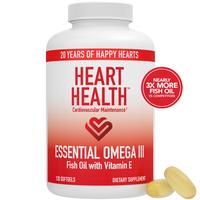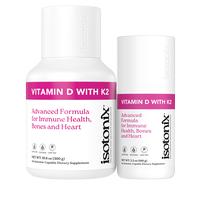Complete
Care From
Head To Toes
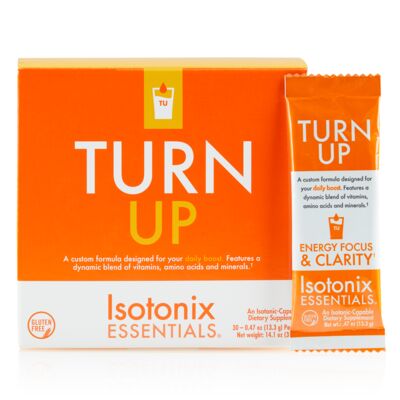
Isotonix Essentials® Turn Up
sku 6703
$83.95
$ 1.68 Cashback
This product qualifies for free or reduced cost shipping. Learn More
Primary Benefits* of Isotonix Essentials® Turn Up
Energy, focus and clarity.
- Increases energy
- Provides strong antioxidant protection
- Helps improve mental focus
- Promotes cognitive health
- Promotes normal regulation of enzymes and hormones
- Helps with energy and stamina
Energy, Focus and Clarity
What Makes Isotonix Essentials Turn Up Unique?
Is that mid-morning or afternoon slump hitting you like a truck? Are you tired of your energy crashing at times when being alert and focused is crucial to your productivity? Whether it is 10 a.m. or 2 p.m., get energized, stay focused and keep sharp with Isotonix Essentials® Turn Up.* Isotonix Essentials Turn Up is a custom blend of vitamins, amino acids and minerals designed for anyone who needs a daily boost. The formula not only increases energy, but it also helps improve mental acuity and promotes cognitive health. This unique energy supplement offers a synergistic blend of ingredients to boost energy in the body and the mind.* With this powerhouse to support energy and promote concentration, you can fuel your day with Isotonix Essentials Turn Up!*
*These statements have not been evaluated by the Food and Drug Administration. This product(s) is not intended to diagnose, treat, cure or prevent any disease.
Product Classifications
Gluten-Free - The finished product contains no detectable gluten (<10ppm gluten)
No Detectable GMOs - The finished product contains no detectable genetically-modified organisms
Isotonic-Capable Drinkable Supplements - Easy-to-swallow supplements in liquid form are immediately available to the body for absorption
Quality Standards - GMP Operations and Standardized Ingredients
Checked For: Heavy Metals, Microbiological Contaminants, Allergens, Residual Solvents, Potency, Purity and Identity
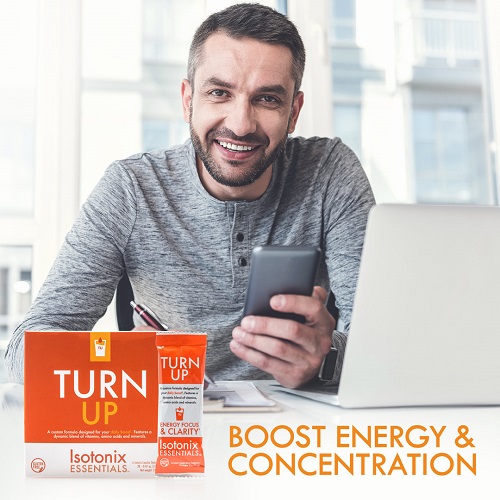
Directions For Use
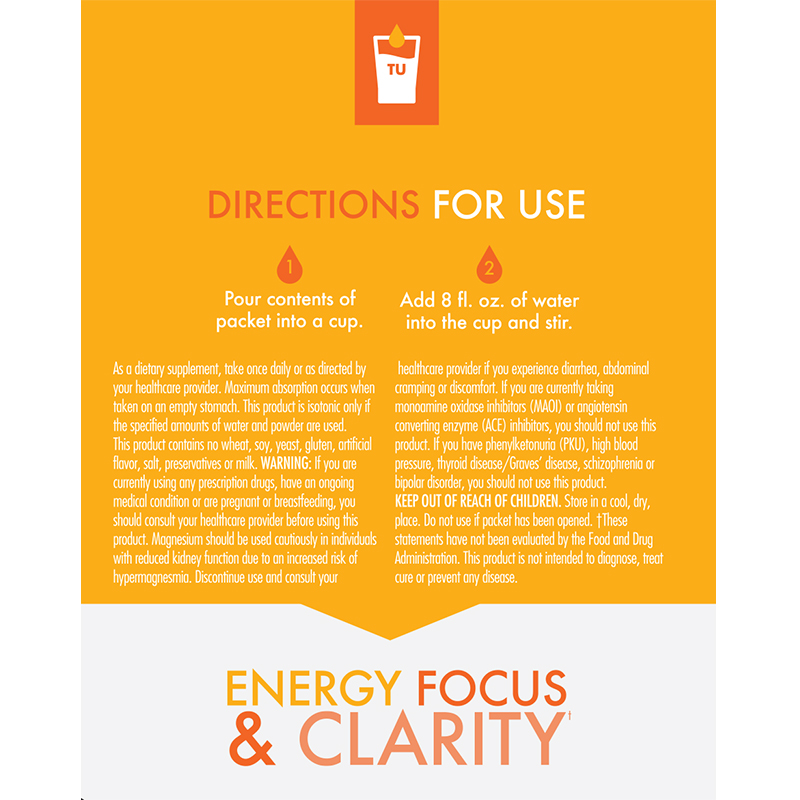
1. Add one contents of packet into a cup.
2. Add 8 fl. oz. of water into the cup and stir.
As a dietary supplement, take once daily or as directed by your healthcare provider. Maximum absorption occurs when taken on an empty stomach. This product is isotonic only if the specified amounts of water and powder are used.
Key Ingredients
Açai Fruit Pulp/Açai Extract
The açai berry has been harvested from the depths of the rainforests of Brazil by the people who have been using it for thousands of years. Açai berries contain thiamin (B1), niacin (B3), riboflavin (B2), vitamin E, vitamin C, phosphorus, calcium, potassium, fiber, proteins and fatty acids such as Omega 6 and Omega 9. Açai berries contain high levels of antioxidants, with studies showing higher antioxidant properties than red wine grapes. The dense pigmentation of açaí has led to several experimental studies of its anthocyanins, a group of polyphenols that give the deep color to fruits and vegetables and are high in antioxidant value.*
Magnesium (Citrate & Glycinate)
Magnesium is a component of the mineralized part of bone and supports the normal metabolism of potassium and calcium in adults. It helps maintain normal levels of potassium, phosphorus, calcium, adrenaline and insulin. It also promotes the normal mobilization of calcium, transporting it inside the cell for further utilization. It supports the normal functioning of muscle and nervous tissue. Magnesium promotes the normal synthesis of proteins, nucleic acids, nucleotides, cyclic adenosine monophosphate, lipids and carbohydrates.* Magnesium is required for release of energy and it promotes the normal regulation of body temperature and proper nerve function, it helps the body handle stress, and it promotes a healthy metabolism. Magnesium works together with calcium to help maintain normal blood pressure. Importantly, magnesium also supports the body’s ability to build healthy bones and teeth, and promotes proper muscle development. It works together with calcium and vitamin D to help keep bones strong. Magnesium also promotes cardiovascular health by supporting normal platelet activity and helping to maintain normal cholesterol levels.*
L-Phenylalanine
L-Phenylalanine is an essential amino acid. Amino acids are the building blocks of protein. The body cannot produce L-phenylalanine so it must be obtained through diet or supplementation. The main dietary sources of L-phenylalanine are high protein foods such as meat, fish, eggs and dairy products. Sugar-free products containing the artificial sweetener aspartame (NutraSweet), which is composed of a combination of phenylalanine with another amino acid – aspartic acid, may also be a significant dietary source of L-Phenylalanine. Amino acids come in two forms, designated as L- and D- forms. The L- form is the naturally occurring form in foods, whereas the D- form is the synthetic variety. L-phenylalanine acts as an amino acid precursor boosting noradrenalin production, which in turn increases mental alertness. L-phenylalanine helps to provide steady energy throughout the day, without the crash that typically follows the consumption of energy products with high sugar content.* L-phenylalanine is an electrically-neutral amino acid, one of the 20 common amino acids used to biochemically form proteins and enzymes, coded by our DNA. L-phenylalanine is necessary for living organisms, including the human body. L-phenylalanine can be converted into L-tyrosine, another of the 20 protein-forming amino acids. L-tyrosine is converted into L-DOPA, which is further converted into dopamine, norepinephrine and epinephrine (latter three are known as the catecholamines).* Vitamin B6, folic acid and vitamin C are needed in order to convert phenylalanine into noradrenaline. Noradrenalin is the brain’s natural energy source, promoting alertness, mental energy and focus.*
Guarana Extract
Guarana extract is derived from the seeds of the South American guarana shrub (Paullinia cupana), most of which originates in Brazil. Traditional uses of guarana by natives of the Amazon Rainforest include mixing crushed seeds in foods and beverages to promote alertness, mental energy and focus. As a dietary supplement, guarana is an effective energy booster, as it contains about twice the caffeine found in coffee beans (about three to four percent caffeine in guarana seeds compared to one to two percent for coffee beans). Guarana may enhance mental performance. The seeds of guarana are known to contain xanthines (caffeine) and have been widely used as a tonic in many South American countries, particularly Brazil. In studies, which have determined the total xanthine content of guarana powder, caffeine content typically averages 30 to 50 percent (depending on the extract). Related compounds such as theobromine and theophylline are found at levels of (one to three percent). Most of the scientific evidence on caffeine as a general stimulant and an aid to exercise performance shows convincingly that caffeine is effective.*
L-Taurine
L-Taurine is a building block for all the other amino acids. It aids in the transport of potassium, sodium, calcium and magnesium in and out of cells, thus supporting the normal generation of nerve impulses. It is a non-protein amino acid and is found in high amounts in the brain, retina, myocardium, skeletal and smooth muscle, platelets and neutrophils. It is plentiful in the fluids of muscle, lungs and nerve tissue. Dietary taurine mainly comes from animal food sources. Taurine is also present, in lower levels, in plant food sources like seaweed. It is classified as an essential amino acid and promotes normal micelle formation and fat absorption. Further, it promotes alertness, mental energy and focus. Taurine also has antioxidant. It may also help maintain a healthy cardiovascular system and support detoxifying activities.*
Mangosteen Powder
The mangosteen is an evergreen tree about 10 to 25 meters tall, grown in tropical climates such as Asia, South America and Polynesia. Mangosteen fruit is often called the Queen of Fruits due to its pleasant flavor. The mangosteen fruit is round with slightly flattened ends and is about six to seven centimeters in diameter. It has a smooth, thick, firm rind that is pale green when immature and dark purple or red-purple when ripe. Enclosed by the rind is the edible pulp in four to eight white segments. Each fruit has one to two seeds. The mangosteen fruit contains a compound called xanthones, which is thought to have antioxidant properties. The plant is also a rich source of other bioactive molecules including flavenoids, benzophenones, lactones and phenolic acids. A variety of xanthones can be isolated from the hull, rind, heartwood and flesh of mangosteen plants and fruit. Some studies have demonstrated that the xanthones found in mangosteen have antioxidant properties; six xanthones found in the mangosteen fruit were isolated from the fruit peel.*
L-Tyrosine
L-Tyrosine is an amino acid found naturally in our bodies. Tyrosine is metabolized into neurotransmitters such as dopamine, norepinephrine and epinephrine. Neurotransmitters are important because they carry messages from one nerve cell to another, thereby playing a vital role in our muscular and cognitive function. Scientists believe that the main cause of mental fatigue is directly related to decreased levels of dopamine, norepinephrine and other neurotransmitters in the brain. Many scientists believe that tyrosine can help relieve occasional symptoms of mental and physical fatigue.*
L-Glycine
Glycine is an important amino acid that supports the body’s synthesis of non-essential amino acids. Glycine is one of the few amino acids that can spare glucose for energy by improving glycogen storage. Glycine is useful in the synthesis of DNA and is readily converted into creatine. The body requires glycine for the maintenance of the central nervous system. In men, glycine plays an essential role in maintaining healthy prostate functions.*
Vitamin C
Vitamin C, a water-soluble vitamin that acts as an antioxidant, has been proven to support the normal growth and repair of body tissues, support of cardiovascular health, reduced oxidative stress, and promote cognitive health and performance.*
Coenzyme Q10
Coenzyme Q10 belongs to a family of substances called ubiquinones, and is a fat-soluble, wax-like substance that is part of the respiratory chain. It is synthesized in the cells and is involved in electron transport and energy production in mitochondria where about 95 percent of the total energy required by the human body is generated. In the cellular system, CoQ10 supports the generation of energy from oxygen, in the form of ATP. CoQ10 also exhibits activity as a free radical scavenger and an antioxidant. The antioxidant activity in the mitochondria and cell membranes protects against peroxidation of lipid membranes.* Coenzyme Q10 can be found in spinach, broccoli, nuts, meats and fish. In the body, it is found in highest concentration in the cells of the heart, liver, kidney, spleen and pancreas, which all require vast amounts of energy. Supplementation with CoQ10 may be most beneficial for adults because the levels of CoQ10 in the body tend to peak around the age of twenty and then decline with age.*
Pomegranate Extract (40% Ellagiac Acid)
One pomegranate delivers 40 percent of an adult's daily vitamin C requirement, and also provides folic acid and antioxidants. Pomegranates are high in polyphenols. The most abundant polyphenols in pomegranate are hydrolysable tannins, particularly punicalagins, which research has shown to be the antioxidant responsible for the free-radical scavenging ability of pomegranate juice.* Many food and dietary supplement makers have found the advantages of using pomegranate extracts (which have no sugar, calories or additives), instead of the juice, as ingredients in their products. Many pomegranate extracts are essentially ellagic acid, which is largely a by-product of the juice extraction process. Ellagic acid has been shown in published studies to absorb into the body when consumed as ellagitannins such as punicalagins.*
Yerba Maté Extract
Yerba maté is an evergreen with white flowers and red fruit, found naturally only in South America. The dried or roasted leaves, which contain caffeine, are used in nutritional products. Yerba maté contains xanthines, which are alkaloids in the same family as caffeine, theophylline and theobromine, well-known stimulants also found in coffee and chocolate. Yerba Maté also contains potassium, magnesium and manganese.* Like coffee, Yerba Maté stimulates the central nervous system. It may promote strong heart contractions, heart rhythm, and may support the break down of sugars in the body. It is largely used to fight occasional fatigue. Yerba Maté has been shown to promote alertness, mental energy and focus, without the negative effects typically created by similar compounds. Yerba Maté creates a powerful answer to occasional mental and physical fatigue. Yerba maté is used worldwide as a rejuvenator of energy and mental alertness.*
Green Tea
Green tea extract has been used nutritionally for centuries in India and China. A number of beneficial health effects are related to regular consumption of green tea and dried/powdered extracts of green tea that are available in some dietary supplements. Green tea is prepared by picking, lightly steaming and allowing the leaves to dry. The active components in green tea are a family of polyphenols (catechins) and flavonols, which possess potent antioxidant activity. Several catechins are present in major quantities; epicatechin (EC), epigallocatechin (EGC), epicatechin gallate (ECG) and epigallocatechin gallate (EGCG). EGCG makes up around 10 to 50 percent of the total catechin content and appears to be the most powerful of all the catechins, with demonstrated antioxidant activity. Green tea extract is reported to have positive effects including cardiovascular system support.* Green tea contains a substantial amount of antioxidants, including epigallocatechin gallate (EGCG). Green tea’s polyphenolic antioxidants support cardiovascular health, help combat free radicals and support the normal oxidation of LDL cholesterol. Aside from the clear benefits of green tea as an antioxidant, recent studies have suggested green tea may support weight control.* ‡This extract is decaffeinated.
L-Carnitine
L-carnitine is an amino acid that is found in nearly all cells of the body. L-carnitine supports fat metabolism in the heart, organs and tissue. L-carnitine occurs naturally in animal products and only very small amounts are found in plants, with a few exceptions, such as avocado and some fermented soy products. It also plays an essential role in the transportation of long chain fatty acids into the mitochondria of the cell, which results in additional energy in the form of adenosine triphosphate (ATP). L-carnitine is synthesized in the body, mainly in the liver and kidneys, from the essential amino acids L-lysine and L-methionine.*
Niacinamide
Niacin is a water-soluble vitamin that supports many aspects of health, growth and reproduction. Niacin supports the proper functioning of the digestive system, skin and nerves. It promotes the conversion of food to energy. Niacin is found in dairy products, poultry, fish, lean meats, nuts, eggs, legumes, and enriched breads and cereals.*.
Lipase
Lipase is a fat-digesting enzyme that supports the body’s normal break down of dietary fats into an absorbable form. Lipases, such as human pancreatic lipase, support the normal conversion of triglyceride substrates found in oils from food to monoglycerides and free fatty acids. Some lipases also work within the interior spaces of living cells to support the normal degradation of lipids.*
Vitamin B6 (Pyridoxine HCl)
Poultry, fish, whole grains and bananas are the main dietary sources of vitamin B6. B6 supports normal protein and amino acid metabolism, and helps maintain proper fluid balance. It also assists in the maintenance of healthy red and white blood cells, which supports our overall health. Vitamin B6 promotes normal hemoglobin synthesis (hemoglobin is the protein portion of red blood cells which carries oxygen throughout the body). Because vitamin B6 is involved in the synthesis of neurotransmitters in the brain and nerve cells, it has been recommended as a nutrient to support mental function, specifically mood. Athletic supplements often include vitamin B6 because it promotes the conversion of glycogen to glucose for energy in muscle tissue. Vitamin B6, when taken with folic acid, has been shown to help maintain normal plasma levels of homocysteine, which promotes optimal cardiovascular health. Vitamin B6 should be taken as a part of a complex of other B vitamins for best results.*
Pantothenic Acid (d-Calcium Pantothenate)
Pantothenic acid promotes proper neurotransmitter activity in the brain. Pantothenic acid is also known as the anti-stress vitamin and it promotes the secretion of hormones essential for optimal health.*
Boron
Boron is a mineral found at high levels in plant foods such as dried fruits, nuts, dark green, leafy vegetables, applesauce, grape juice and cooked dried beans and peas. Boron is found in most tissues, but mainly in the bone, spleen and thyroid. Boron supports normal bone and hormone metabolism. Boron supports the body’s ability to build and maintain healthy bones. It also helps the body retain calcium and magnesium to promote proper bone mineralization. Boron is an essential cofactor for the conversion of vitamin D to its active form. It supports the maintenance of healthy cell membranes, proper mental functioning and alertness, and helps maintain normal serum estrogen levels and ionized calcium.*
Chromium (Arginate, Picolinate)
Chromium arginate is a form of chromium that is bonded with the essential amino acid Arginine. Like chromium picolinate, it too can support normal insulin activity and the metabolism of protein, fat and carbohydrates.* Together with chromium picolinate, chromium arginate helps to support cardiovascular health by helping to maintain normal insulin sensitivity. It also helps maintain healthy blood sugar and cholesterol levels.*
Copper (Gluconate)
The richest sources of dietary copper derive from organ meats, seafood, nuts, seeds, wheat bran cereal, whole grain products and cocoa products. Copper has antioxidant properties and acts as a component of enzymes in iron metabolism. It is an essential trace mineral. Copper supports normal infant development, red and white blood cell maturation, iron transport, bone strength, cholesterol metabolism, myocardial contractility, glucose metabolism, brain health and immune function.*
Folic Acid
Folic acid is mainly found in fruits and vegetables. Dark, leafy greens, oranges, orange juice, beans, peas and Brewer’s yeast are the best sources. Folic acid plays a key role by boosting the benefits of B12 supplementation. These two B vitamins join forces and work together to help maintain normal red blood cells. Folic acid assists in the normal utilization of amino acids and proteins, as well as supporting the construction of the material for DNA and RNA synthesis, which is necessary for all bodily functions. Scientific studies have found that when working in tandem with folic acid, B12 is capable of promoting normal homocysteine levels. This works toward supporting a healthy cardiovascular and nervous system.*
Vitamin B12 (methylcobalamin)
Vitamin B12 is a bacterial product naturally found in animal products, especially organ meats, such as liver, with small amounts derived from peanuts and fermented soy products, such as miso and tempeh. It is essential that vegetarians consume a vitamin B12 supplement to maintain optimal health. Vitamin B12, when ingested, is stored in the liver and other tissues for later use. It supports the normal maintenance of cells, especially those of the nervous system, bone marrow and intestinal tract. Vitamin B12 supports normal homocysteine metabolism (homocysteine is an amino acid that is formed within the body). Normal homocysteine levels are important for maintaining cardiovascular health. Folate and B12, in their active coenzyme forms, are both necessary to support the conversion of homocysteine to methionine, thus helping to maintain healthy blood levels of homocysteine.*
FAQs
- What does Isotonix mean?
Isotonix dietary supplements are delivered in an isotonic liquid solution. This means that the body has less work to do in obtaining maximum absorption. The isotonic state of the suspension allows nutrients to pass efficiently into the small intestine and be rapidly delivered into the bloodstream. With Isotonix® products, little nutritive value is lost, making the absorption of nutrients highly efficient while delivering maximum results.* - Who should use Isotonix Essentials Turn Up?
Those looking to increase energy and support cognitive health.* - How often should I use Isotonix Essentials Turn Up?
As a dietary supplement, take once daily or as directed by your healthcare provider. - Are there any contraindications or warnings for this product?
If you are currently using any prescription medication or have an ongoing medical condition, you should consult your healthcare provider before using this product. Magnesium should be used cautiously in individuals with reduced kidney function due to an increased risk of hypermagnesemia. Discontinue use and consult your healthcare provider if you experience diarrhea, abdominal cramping or discomfort. If you are currently taking monoamine oxidase inhibitors (MAOI) or angiotensin converting enzyme (ACE) inhibitors, you should not use this product. If you have phenylketonuria (PKU), high blood pressure, thyroid disease/Graves’ disease, schizophrenia or biopolar disorder, you should not use this product. Take this supplement separately from prescription drugs. Women who are pregnant or breastfeeding should not use this product. - What is the best way to store this product?
Keep Isotonix stored in a dry, cool place. If Isotonix are stored in the kitchen, keep them away from the stove, sink, heat-generating appliances or window ledges. If you live in a very humid area, you may store Isotonix products in the refrigerator – but not in the fruit and vegetables area. - How does Turn Up differ from other energy products on the market?
Today’s energy products tend to be loaded full of sugar and stimulants that ultimately deplete the body over time. They provide a limited boost of energy followed by a crash later on, leaving you feeling tired. Turn Up combines nutrients that support energy metabolism by allowing the body to:
- Generate energy with ingredients like mangosteen and acai. Two scientifically supported ingredients because of their xanthione content. Xanthiones are similar in their ability to generate energy. Xanthones help support sustained energy, because they use fatty acids for energy, which have a longer energy burn than the sugars in many alternative energy products.
- Magnesium, Chromium and CoQ10 are some of the drivers of the body’s energy and recovery cycles.
- Support mental focus. Acai, especially when takin in combination with the other Turn Up ingredients, can support cognitive health.*
Science
- Anderson RA. Effects of chromium on body composition and weight loss. Nutr Rev. 1998; 56:266-270.
- Berube-Parent, S., et al. Effects of Encapsulated Green Tea and Guarana Extracts Containing a Mixture of Epigallocatechin-3-gallate and Caffeine on 24-H Energy Expenditure and Fat Oxidation in Men. British Journal of Nutrition. 94(3): 432-436, 2005.
- Bohmer T, Rynding A, Solberg HE. Carnitine levels in human serum in health and disease. Clin Chim Acta. 1974; 57:55-61.
- Boozer, C., et al. An Herbal Supplement Containing Ma Huang-Guarana for Weight Loss: a Randomized, Double-blind Trial. International Journal of Obesity. 25(3): 316-324, 2001.
- Brilla, L. R., et al. Effect of magnesium supplementation on strength training in humans. J Am Coll Nutr. 11(3):326-329, 1992.
- Carr, A., et al. Vitamin C Protects Against and Reverses Specific Hypochlorous Acid- and Chloramine-dependent Modifications of Low-density Lipoprotein. Biochemical Journal. 346: 491–499, 2000.
- Cerulli J, Grabe DW, Gauthier I, et al. Chromium picolinate toxicity. Ann Pharmacother. 1998; 32:428-431.
- Crane FL, Sun IL, Sun EE. The essential functions of coenzyme Q. Clin Investig. 1993; 71(Suppl):S55-S59.
- Del Pozo-Insfran, D., et al. Phytochemical Composition and Pigmentation S
- Duthie, S., et al. Homocysteine, B vitamin Status, and Cognitive Function in the Elderly. American Journal of Clinical Nutrition. 75(5):908-913, 2002.
- Folkers K, Mortensen SA, Littarru GP, Yamagami T, Lenaz G, eds. The biochemical and clinical aspects of coenzyme Q. Clin Investig. 1993; 71(Suppl):S51-S178.
- Gruber H et al. Magnesium deficiency: effect on bone mineral density in the mouse appendicular skeleton. BMC Musculoskelet Disord. 4(1):7, 2003.
- Hassimotto, N., et al. Antioxidant Activity of Dietary Fruits, Vegetables, and Commercial Frozen Fruit Pulps. Journal of Agricultural and Food Chemistry. 53: 2928-2935, 2005.
- Hillstrom, R., et al. Vitamin C Inhibits Lipid Oxidation in Human HDL. Journal of Nutrition. 133: 3047-3051, 2003.
- Huang, R., et al. N-Acetylcysteine, Vitamin C and Vitamin E Diminish Homocysteine Thiolactone-Induced Apoptosis in Human Promyeloid HL-60 Cells. Journal of Nutrition. 132: 2151-2156, 2002.
- Huskisson E et al. The influence of micronutrients on cognitive function and performance. J Int Med Res. 35(1):1-19, 2007. Review.
- Institute of Medicine. Food and Nutrition Board. Dietary Reference Intakes: Calcium, Phosphorus, Magnesium, Vitamin D and Fluoride. National Academy Press. Washington, DC, 1999.
- International Symposium on the Health Effects of Dietary Chromium. J Trace Elem Exp Med. 1999; 12:53-169.
- Jung, H., et al. Antioxidant Xanthones from the Pericarp of Garcinia Mangostana (Mangosteen). Journal of Agricultural and Food Chemistry. 54(6): 2077-2082, 2006.
- Kaats GR, Blum K, Fisher JA, Adelman JA. Effects of chromium picolinate supplementation on body composition: a randomized, double-masked, placebo-controlled study. Curr Therap Res. 1996; 57:747-756.
- Kobrin SM and Goldfarb S. Magnesium Deficiency. Semin Nephrol. 10:525-35, 1990.
- Kovacs, E. and Mela, D. Metabolically Active Functional Food Ingredients for Weight Control. Obesity Reviews. 7(1): 59-78, 2006.
- Lenton, Kevin J., et al. Vitamin C Augments Lymphocyte Glutathione in Subjects with Ascorbate Deficiency. American Journal of Clinical Nutrition. 77: 189-195, 2003
- Li, C., et al. Green Tea Polyphenols Modulate Insulin Secretion by Inhibiting Glutamate Dehydrogenase. The Journal of Biological Chemistry. 281(15):10214-21, 2006.
- Marx, F., et al. The Total Oxidant Scavenging Capacity (TOSC) Assay and Its Application to European and Under-utilized Brazilian Fruits. Lebensmittelwissenschaftliches Seminar der DAAD-Alumni, Fortaleza/Brasilien. 11: 21-23, 2005
- Merz W. Chromium in human nutrition: a review. J Nutr. 1993; 123:626-633.
- Murase, T., et al. Green Tea Extract Improves Endurance Capacity and Increases Muscle Lipid Oxidation in Mice. American Journal of Physiology. 288(3): R708-715, 2005.
- Nakatani, K., et al. Inhibitions of Cyclooxygenase and Prostaglandin E2 Synthesis by -Mangostin, a Xanthone Derivative in Mangosteen, in C6 Rat Glioma Cells. Biochemical Pharmacology. 63: 73-79, 2002.
- Nakatani, K., et al. -Mangostin Inhibits Inhibitor- B Kinase Activity and Decreases Lipopolysaccharide-Induced Cyclooxygenase-2 Gene Expression in C6 Rat Glioma Cells. Molecular Pharmocology. 66: 667-674, 2004.
- Nam, S., et al. Ester Bond-containing Tea Polyphenols Potently Inhibit Proteasome Activity In Vitro and In Vivo. Journal of Biological Chemistry. 276(16): 13322-13330, 2001.
- New SA et al. Nutritional influences on bone mineral density: a cross-sectional study in premenopausal women. Am J Clin Nutr. 65:1831-9, 1997.
- Parcell, S. Sulfur in Human Nutrition and Application in Medicine. Alternative Medicine Review. 7(1): 22-44, 2002.
- Rebouche CJ, Paulson DJ. Carnitine metabolism and function in humans. Ann Rev Nutr. 1986; 6:41-68.
- Rebouche CJ. Carnitine function and requirements during the life cycle. FASEB J. 1992; 6:3379-3386.
- Riggs, K., et al. Relations of Vitamin B-12, Vitamin B-6, Folate, and Homocysteine to Cognitive Performance in the Normative Aging Study. American Journal of Clinical Nutrition. 63(3):306-314, 1996.
- Rink, L. and Kirchner, H. Zinc-Altered Immune Function and Cytokine Production. Journal of Nutrition. 130: 1407S-1411S, 2000.
- Roberts, A., et al. The Effect of an Herbal Supplement Containing Black Tea and Caffeine on Metabolic Parameters in Humans. Alternative Medical Review. 10(4): 321-325, 2005.
- Rodriques, R., et al. Total Oxidant Scavenging Capacities of Euterpe Oleracea Mart. (Açaí Seeds) and Their Polyphenolic Compounds. Annual Meeting of the Brazilian Society of Chemistry. 29: 19-22, 2006.
- Rude KR. Magnesium metabolism and deficiency. Endocrinol Metab Clin North Am. 22:377-95, 1993.
- Ruz, M., et al. Single and Multiple Selenium-Zinc-Iodine Deficiencies Affect Rat Thyroid Metabolism and Ultrastructure. Journal of Nutrition. 129: 174-180, 1999.
- Ryder K et al. Magnesium intake from food and supplements is associated with bone mineral density in healthy older white subjects. J Am Geriatr Soc. 53(11):1875-1880, 2005.
- Saris NE, Mervaala E, et al. Magnesium: an update on physiological, clinical, and analytical aspects. Clinica Chimica Acta. 294:1-26, 2000.
- Saris, N.-E. L., et al. Magnesium: an update on physiological, clinical and analytical aspects. Clinica Chimica Acta. 294:1-26, 2000.
- Sato, A., et al. α-Mangostin Induces Ca2+-ATPase-Dependent Apoptosis via Mitochondrial Pathway in PC12 Cells. Journal of Pharmacology. 95: 33-40, 2004.
- Schauss, A., et al. Antioxidant Capacity and Other Bioactivities of the Freeze-dried Amazonian Palm Berry, Euterpe Oleraceae Mart. (Acai). Journal of Agricultural and Food Chemistry. 54(22): 8604-10, 2006.
- Tang, X. and Shay, N. Zinc Has an Insulin-Like Effect on Glucose Transport Mediated by Phosphoinositol-3-Kinase and Akt in 3T3-L1 Fibroblasts and Adipocytes. Journal of Nutrition. 131: 1414-1420. 2001.
- Tranquilli AL et al. Calcium, phosphorus and magnesium intakes correlate with bone mineral content in postmenopausal women. Gynecol Endocrinol. 8:55-8, 1994.
- Tsuboyama-Kasaoka, N., et al. Taurine (2-aminoethanesulfonic acid) Deficiency Creates a Vicious Circle Promoting Obesity. Endocrinology. 147(7): 3276-3284, 2006.
- Tucker KL, Hannan MT, Chen H, Cupples LA, Wilson PW, Kiel DP. Potassium, magnesium, and fruit and vegetable intakes are associated with greater bone mineral density in elderly men and women. Am J Clin Nutr. 69(4):727-36, 1999.
- Ukkola, O., et al. Protein Tyrosine Phosphatase 1B Variant Associated with Fat Distribution and Insulin Metabolism. Obesity Research. 13: 829-834, 2005.
- Vormann J. Magnesium: nutrition and metabolism. Molecular Aspects of Medicine. 24:27-37, 2003.
- Warburton, D., et al. An Evaluation of a Caffeinated Taurine Drink on Mood, Memory and Information Processing in Healthy Volunteers without Caffeine Abstinence. Psychopharmacology. 158: 322-328, 2001.
- Wester PO. Magnesium. Am J Clin Nutr. 45:1305-12, 1987.
- Westerterp- Plantenga, M., et al. Body Weight Loss and Weight Maintenance in Relation to Habitual Caffeine Intake and Green Tea Supplementation. Obesity Research. 13: 1195- 1204, 2005.
- Yu-Yahiro, J. A. Electrolytes and their relationship to normal and abnormal muscle function. Orthop Nurs. 13(5):38-40, 1994.
Reviews
Displaying 1 - 5 of 94
06/07/2025
by ALLISONA
Best for mental clarity and focus
Just the best pick me up. I used to reach for coffee in the afternoon but the Açai advanced energy in this product really gives me the afternoon boost I need and packed with so many other ingredients that are good for me. If you get sluggish in the afternoon, try this. You will not be disappointed.
Response from Customer Service
06/09/2025
Thank you so much for your fantastic review of nutraMetrix Isotonix Essentials® Turn Up! We’re delighted to hear that it gives you the afternoon boost you need and that you appreciate the blend of beneficial ingredients. Your feedback is valuable and will be helpful to others looking for new ways to support their energy and focus. Thank you for being a valued member of our community and sharing your experience!
02/17/2025
by SusanK
Energy
This replace my Red Bull and monster drink for me it was and is better than both energy drinks I tried in the past and it doesn’t leave you sluggish go turn up with out the side effects of getting drowsy like the other two drinks do
Response from Customer Service
02/18/2025
Thank you for your fantastic review of Isotonix Essentials® Turn Up! We're thrilled to hear that it has become your go-to choice for energy, replacing other options you've tried in the past. Knowing that it provides a boost without causing sluggishness is wonderful to hear. We appreciate your feedback and enthusiasm for "turning up" with our product!
02/07/2025
by ReneeB
Just the boost I needed
Turn Up is the little extra boost the immune system needed and I always feel more clear headed after taking .
Response from Customer Service
02/07/2025
Thank you for your fantastic review of Isotonix Essentials® Turn Up! We're thrilled to hear that it provides you with the boost you're looking for and contributes to greater clarity. Your satisfaction and trust mean a lot to us, and we're delighted to play a part in your daily routine. Thank you for choosing Isotonix Essentials® and for sharing your positive experience!
01/31/2025
by ErikaW
Energy Boost!!
I will ALWAYS have Turn Up on me . . . the energy boost and brain clarity is just insane! I use one packet DAILY - sometimes 2 if it's a long day. It tastes YUMMY - like a fruit juice.
Response from Customer Service
02/03/2025
Thank you for your enthusiastic review of Isotonix Essentials® Turn Up! We're thrilled to hear that it's your go-to product for an energy boost and enhanced clarity. It's fantastic that you find it so effective, and we’re delighted that you enjoy the fruit juice-like taste. Your commitment to using it daily, and sometimes even twice, means a lot to us. Thank you for making Isotonix Essentials® Turn Up a part of your daily routine!
12/02/2024
by PamelaS
I get more done and feel great
I have used this for an afternoon slump or if I went to a conference where I wanted to pay more attention.
Recently I started using this in the AM and add Isotonic OPC3 to it as I believe everyone should use that herb several times a day.
My energy stays up all day when I take NAD late morning or early afternoon.
I love being alert and focused all day!
Response from Customer Service
12/02/2024
Thank you for your detailed review! We're thrilled to hear that incorporating NAD and Isotonix OPC-3 into your routine has helped you maintain energy, alertness, and focus throughout the day. It's great to know that our products support your productivity and well-being. Your insights are invaluable, and we appreciate your continued support!
- Prev
- Next


